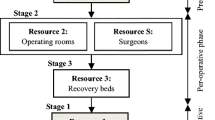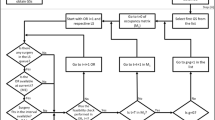Abstract
The scheduling problem in surgery is difficult because, in addition of the planning of the operating rooms which are the most expensive resources in hospitals, each surgery requires a combination of human and material resources. In this paper, the authors address a surgery scheduling problem which arises in operated health care facility. Moreover, the authors consider simultaneously materiel and human resources. This problem is a three-stages flow shop scheduling environment. The first stage (ward) contains a limited number of resources of the same type (beds); The second stage contains different resources with limited capacity (operating rooms, surgeons, nurses, anesthesiologists) and the third stage contains a limited number of recovery beds. There is also a limited number of transporters (porters) between the ward and the other stages. The objective of the problem is to minimize the completion time of the last patient (makespan). the authors formulate this NP-Hard problem in a mixed integer programming model and conduct computational experiments to evaluate the performance of the proposed model.
Similar content being viewed by others
References
May J H, Spangler W E, Strum D P, et al., The surgical scheduling problem: Current research and future opportunities, Production and Operations Management, 2011, 20(3): 392–405.
Latorre-Nunez G, Ler-Villagra A, Marianov V, et al., Scheduling operating rooms with consideration of all resources, post anesthesia beds and emergency surgeries, Computers Industrial Engineering, 2016, 97: 248–257.
Framinan J M, Gupta J N D, and Leisten R, A review and classification of heuristics for permutation flow-shop scheduling with makespan objective, The Journal of the Operational Research Society, 2004, 55(12): 1243–1255.
Rahimi I and Gandomi A H, A comprehensive review and analysis of operating room and surgery scheduling, Archives of Computational Methods in Engineering, 2021, 28(3): 1667–1688.
Aringhieri R, Landa P, Soriano P, et al., A two level metaheuristic for the operating room scheduling and assignment problem, Computers Operations Research, 2015, 54: 21–34.
Xiang W, Yin J, and Lim G, A short-term operating room surgery scheduling problem integrating multiple nurses roster constraints, Artificial Intelligence in Medicine, 2015, 63(2): 91–106.
Belkhamsa M, Jarboui B, and Masmoudi M, Two metaheuristics for solving no-wait operating room surgery scheduling problem under various resource constraints, Computers Industrial Engineering, 2018, 126: 494–506.
Riise A, Mannino C, and Burke E K, Modelling and solving generalised operational surgery scheduling problems, Computers Operations Research, 2016, 66: 1–11.
Guido R and Conforti D, A hybrid genetic approach for solving an integrated multi-objective operating room planning and scheduling problem, Computers Operations Research, 2017, 87: 270–282.
Bastos L S L, Marchesi J F, Hamacher S, et al., A mixed integer programming approach to the patient admission scheduling problem, European Journal of Operational Research, 2019, 273(3): 831–840.
Rezaeiahari M and Khasawneh M T, An optimization model for scheduling patients in destination medical centers, Operations Research for Health Care, 2017, 15: 68–81.
Zhu S, Fan W J, Liu T Z, et al., Dynamic three-stage operating room scheduling considering patient waiting time and surgical overtime costs, Journal of Combinatorial Optimization, 2020, 39: 185–215.
Zhu S, Fan W J, Yang S L, et al., Scheduling operating rooms of multiple hospitals considering transportation and deterioration in mass-casualty incidents, Annals of Operations Research, 2023, 321(1–2): 717–753.
Rahimi A, Hejazi S M, Zandieh M, et al., A novel hybrid simulated annealing for no-wait open-shop surgical case scheduling problems, Applied System Innovation, 2023, 6(1): 15–36.
Hasani Ali and Hosseini S M H, Auxiliary resource planning in a flexible flow shop scheduling problem considering stage skipping, Computers Operations Research, 2022, 138: 105625.
Augusto V, Xie X, and Perdomo V, Operating theatre scheduling with patient recovery in both operating rooms and recovery beds, Computers Industrial Engineering, 2010, 58(2): 231–238.
Costa A, Fernandez-Viagas V, and Framian J M, Solving the hybrid flow shop scheduling problem with limited human resource constraint, Computers Industrial Engineering, 2020, 146: 106545.
Acknowledgements
We would like to thank Malek Masmoudi for fruitful discussions during the preparation of the manuscript.
Author information
Authors and Affiliations
Corresponding author
Ethics declarations
The authors declare no conflict of interest.
Rights and permissions
About this article
Cite this article
Chikhi, N., Djehiche, B. Patients Transportation in Surgery Scheduling Problem. J Syst Sci Complex 37, 1100–1113 (2024). https://doi.org/10.1007/s11424-024-3073-8
Received:
Revised:
Published:
Issue Date:
DOI: https://doi.org/10.1007/s11424-024-3073-8




